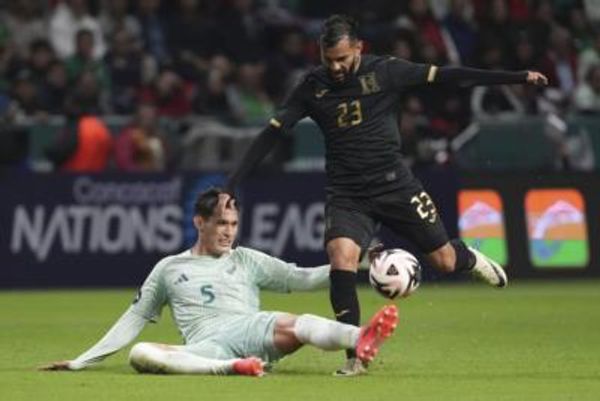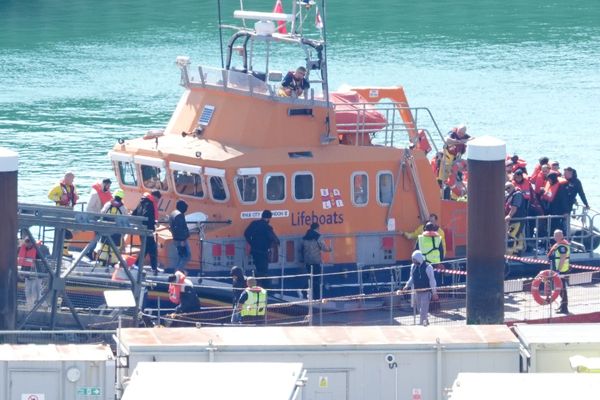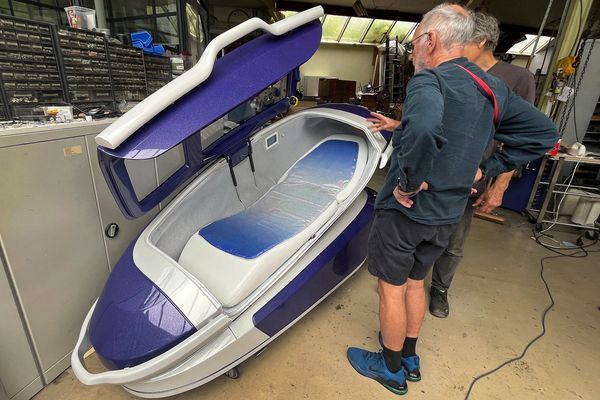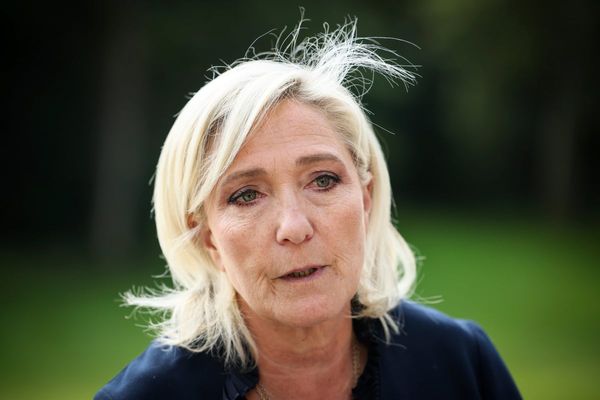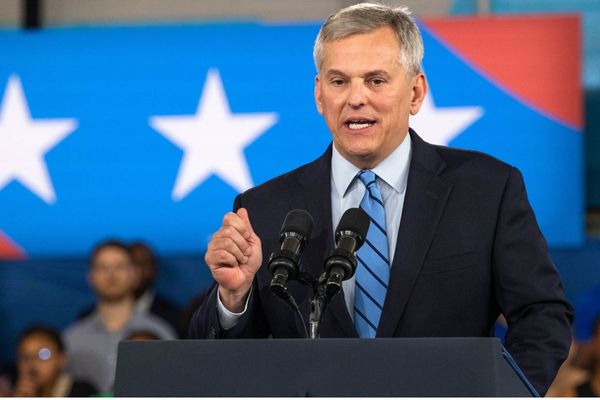
Oleksandr Kucherenko (midfielder, Inhulets Petrove)
When Russia invaded I knew I could not stay still. On 23 February our team had flown back into Kyiv from a training camp. I began to work with volunteer organisations in Lutsk, where I lived with my family, and twice took groups from Kyiv to the Polish border by car. Nothing felt safe: I arranged for my wife, children and mother-in-law to travel to the Czech Republic and then asked myself what I could do next. I have never held a gun, so decided to immerse myself in volunteering.
I am originally from Slavyansk, a city in Donbas. My parents are still there and they have faced a war since 2014. The Russians occupied Slavyansk for a long time; mum and dad pulled through, but dad had a stroke that has made things very difficult.
Now Ukraine holds Slavyansk but the situation across the region is critical and very dangerous. So I started travelling there with humanitarian aid for civilians: things were developing quickly and the frontline was only 15 miles from the city. I went there, to Kramatorsk and around nearby villages, helping whoever I could, and met a lot of soldiers along the way. I resolved to help them too.
Combining volunteering with my football career is hard, but it is what I want to do. I play in our Premier League games and then spend the rest of the weekends on trips to Donbas. I go to Bakhmut, Soledar – before the latter’s occupation in January – and other frontline cities. The military will call and request, for example, a thermal imager: I collect money, find one and bring it to them.

Sergey Lavrienko, our coach at Inhulets until November, knew about my work and was happy for it to continue when the season resumed. After we had restarted training in the summer, one of our brigades in Donbas was badly burned: they needed clothes, food, medicines, everything. The coach told me to take all the time I needed so I could help them.
Being a footballer helps. I do not make a show of it but, when the humanitarian centre in Lutsk found out about my job, they trusted me and gave me as many resources as they could. I have also raised money through social networks, uploading videos of my trips to be as transparent as I can. There have been moments of immediate danger. Once I was a mile and a half away from the Russians, near Kreminna, and saw the neighbouring village shelled and bombed. In Bakhmut I have come under fire twice, once while evacuating people.
I have seen how important it is to help, and also seen the incredible kindness of those at the front. On my birthday in October I brought a Jeep for them there, where they were living in trenches. They set a table for me, found the best food they could, and gave me the most comfortable sleeping bag for the night.
Unfortunately I have seen many people die, including women and children. The Russians brought us war, and I feel hatred and anger towards them in my heart. Perhaps in the future I will set up my own foundation or fund. Football comes first for me, career-wise, but volunteering lights up something inside you.

I miss my family. My wife worries about me a lot and, when I am in dangerous places, they are like guardian angels. If I could go back in time, I would treasure every minute spent with them more deeply. I love them so much and I remember that, before the war, I did not devote enough of my time off to them. Sometimes I gave too much value to the wrong things, and the past year has really opened my eyes.
Ilya Kovalenko (forward, LNZ Cherkasy)
During the early months of the invasion, I was in a stupor. My family are from a village called Kalanchak, in the Kherson region, 20 miles from the border with Crimea: the Russians took it quickly and it meant my mother, the most precious person in the world to me, was living under occupation. I could barely do anything: it was impossible to think, to feel joy or to train. All I could do was wait for her to call and tell me she was OK.
It was hard to stay in touch: she only had phone connection at certain times in the evening. Being unable to call her resembled a terrible dream: all you are thinking about is the situation there. I was glued to the news but nothing was known about exactly what was happening. These were the darkest, most difficult moments for me.
She did not tell me at the time but my mother hid in the basement for much of that period, only going upstairs to cook. The community supported each other. Eventually she left in June: the only option was to go through Russia. She travelled to Simferopol and took a direct bus to Russia’s border with Latvia, where she stood for eight hours in the rain. I am so proud of her.
On 24 February I had been in Turkey on a training camp with LNZ Cherkasy but my career was immediately thrown up in the air. I travelled to Poland and was offered a deal with Ekranas in Lithuania. I played there for two months and was shocked by everyone’s kindness. The club president arranged an apartment for my mum and our captain found her a job. They are delightful, kind people and I cannot thank them enough.

I moved to Akzhayik, in Kazakhstan, until the winter but I knew I could not play abroad any more. I missed Ukraine too much and wanted to be here in these difficult times. Football restarted here so I am back at LNZ for the second half of the season: I have a job, and I can do it thanks to the dedication and skill of our soldiers.
When Kherson was liberated in November, I felt overjoyed and inspired. I constantly send money to different funds, and our team at LNZ is raising money separately for the army. Each of us donates part of his salary every month. Our club doctor is defending Ukraine on the frontline even now, and we try to support him too.
I have rethought family values over the past year. I always put them first, but now I appreciate them even more because I know what it is like to be cut adrift from them. The importance of appreciating the kindness of others, and showing the same qualities, has also hit home. And I appreciate football too: it is great that we can play and train, although clubs suffer financially and it is sad that we cannot invite fans to watch. When there are sirens during the games, we go down into the bomb shelter. It is another reminder of the times we live through. But good always prevails over evil, and I am sure Ukraine will win.

Nazariy Fedorivskyi (goalkeeper, Obolon Kyiv)
Football unites. That has never been clearer than over the past year. It was so important that we could restart our league to give people an outlet outside of Russia’s invasion: something to watch and enjoy, even if not inside the stadiums, that brought people together. We hope that fans of our club, Obolon Kyiv, have been given some pleasure: we are top of the second tier, about to finish the mid-season break, and hope we can finish the job with promotion back to the top flight.
That is only part of what football can give. As players we have all adapted, trying to help, volunteer and donate in any way we can. I run a store in Kyiv that sells trainers and we have diverted a lot of our activities towards helping the military effort. Only last week we ran a charity event to raise funds for army dogs, while a percentage of every sale we make goes directly to the army.
My family have remained here ever since Russia invaded. They try to help too: my mum has a big company that makes fabric for military uniforms. My father was on Maidan Nezalezhnosti in 2013 during the Euromaidan protests and we all know what we are working so hard for.
I am lucky: our club has no financial problems and is well run, which is not the case everywhere. Our pay is not high but it is regular. But last year, after the invasion, everything felt strange and awful. I went to Poland for four months with friends and some of my teammates, eventually returning to Kyiv when the Russians left. Our training ground in Bucha had been mined, struck by missiles and broken into by tanks; by July we could train there again thanks to an incredible job from our staff.

Playing football again felt incredible, but I can’t say whether I feel different in going about my work now. I think I will understand that better in the future: at the moment we are still living this situation together and it is still impossible to understand. Soon I will return from Lviv, where we have a training camp, and we will begin the second half of the season. We are looking forward to it, but hope for something else even more. This is a time for bravery and for dreaming about how our army will kick the Russians out of our country. We are waiting for peace.
Vadym Lazorenko (former manager, Lyubomyr Stavyshche)
Shortly after the war began the club I was managing, Lyubomyr Stavyshche in our third division, dissolved. We had been at a training camp in Mukachevo, far out in Ukraine’s south-west, when it started and stayed there for another three weeks, rallying round and supporting each other. The club president decided we would not continue until Ukraine’s victory, our players went to different clubs, and I found a new role for myself.

Football has become a symbol of the fact Ukraine is not broken. It inspires and shows we continue to live, no matter what. There is no doubt the sport here has been set back a bit: there is less funding, most foreign players have left and many clubs have closed. But it has not hit the bottom: football is still developing, young players are getting earlier opportunities at first-team level, schools and academies are functioning. I feared things would be much worse but at the moment things look good.
After the war, Ukrainian football will surge: I am confident of that. Our foundation is in children’s and youth football, and both continue to thrive. We have young coaches, too, who are professional and actively developing. Nowadays I am training coaches like these, who are studying for their pro licences. My task is to inspire them and tell them how to do the right thing: it is not just about conveying dry information.

I have been around for a while, working at many other clubs such as FC Kryvbas and Vorskla Poltava. I had already developed certain values, so the war has not changed me much. It has simply confirmed to me that you must live for today, live life to the fullest, do good deeds and help others. You need to remain positive and honest in any situation. Since last February I have taken up one new hobby, though. I started writing poetry, and find that it helps me.
